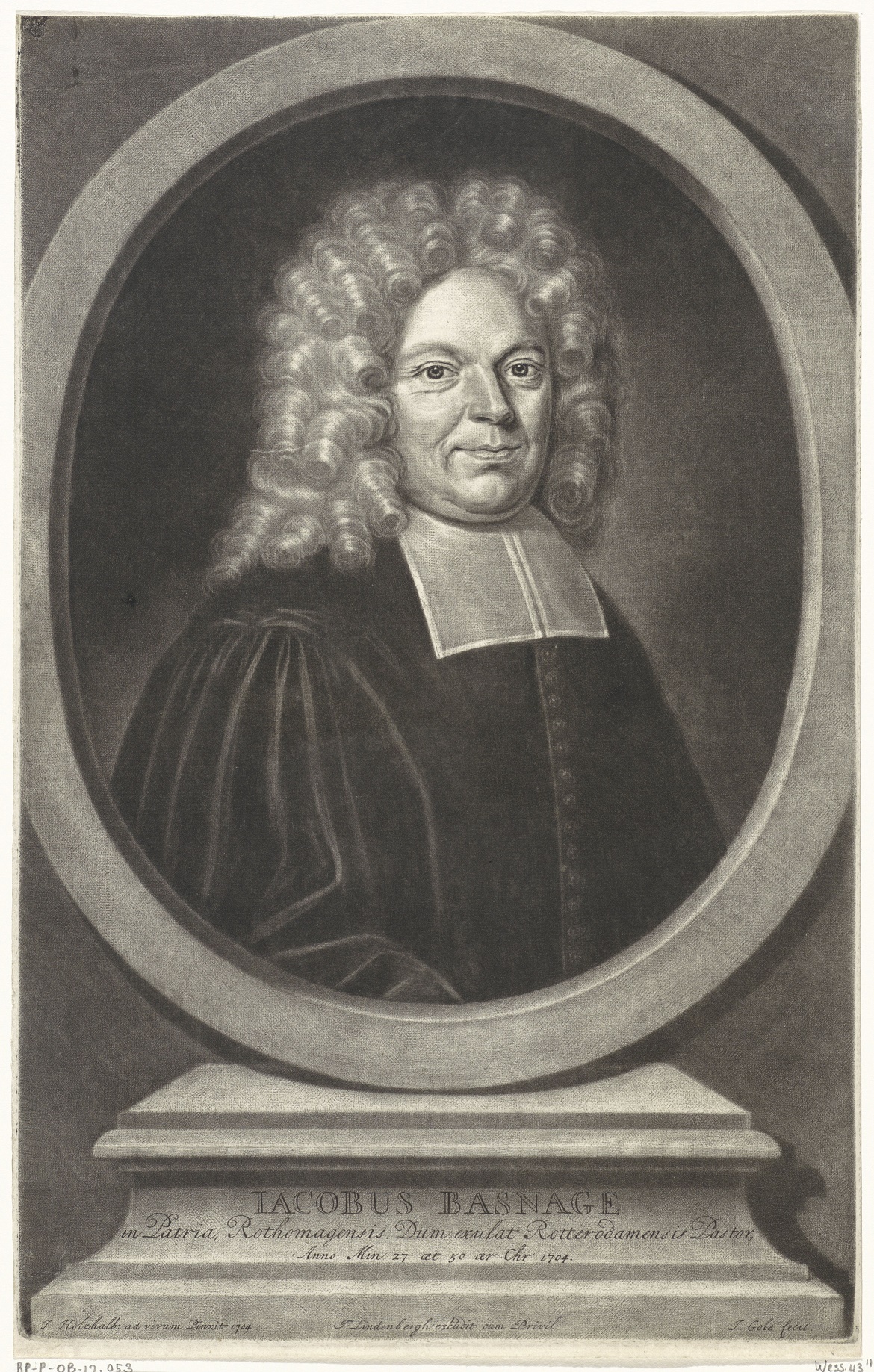
Portrait of Jacques Basnage by Jacob Gole, Jacob Holzhalb, Jacob Lindenberg (1704). Source: Rijksmuseum, Netherlands.
One of the most prolific authors in the Huguenot diaspora following the revocation of the Edict of Nantes in 1685 was Jacques Basnage de Beauval (1653-1723). While serving as a pastor to the Walloon Reformed Churches in Rotterdam and The Hague, he composed several multi-volume history books. In 1706 he had the first part of his Histoire des Juifs depuis Jésus-Christ jusqu’à present published. It was subtitled: Pour servir de continuation à l’Histoire de Joseph, thus presenting itself as a sequel to Josephus’s Jewish history books.
Basnage made use of a wide variety of classical, Christian, and Jewish sources and covered Jewish history all over the world from biblical times up until the contemporary period. His objective was to inform a non-Jewish public on the post-biblical development of Judaism and on the fate of the various Jewish communities. While intimately involved in a creative dialogue with Sephardi authors, he wrote his Histoire des Juifs from a decidedly Christian interpretative perspective and customarily concluded with eschatological prophecies on a future conversion of the Jews to Christianity.
Basnage’s decision to continue Josephus could be seen as commercial, since Josephus enjoyed great popularity in the early modern Republic of Letters, but it was motivated first of all by an interest in Josephus’s works. Basnage considered Josephus one of the best Jewish historians, a respected ancient model to continue, imitate, and – ultimately – emulate. Also in terms of purpose and contents Basnage stressed the continuity with Josephus: both aimed at a non-Jewish public, faithful to the available sources and critical in method.
Basnage used Josephus as a source for the earlier parts of his book, often giving his account credibility over other sources. Josephus’s rhetorical presentation and critical sense were contrasted with ‘legendary’, ‘unreliable’ rabbinic traditions. Throughout his oeuvre Basnage created analogies between rabbinic tradition and traditional Roman Catholicism as opposed to Josephus, the Karaites, and Protestants. Against contemporary Josephus critics he argued: ‘Is it not fair to place him above the Talmudists, or those who offer their fallacies for well-founded truths?’
Basnage’s magnum opus on Jewish history was concluded with the publication of an augmented second edition in nine volumes in 1716. Translations and even pirated editions in the major European languages had already started to appear after the first edition. Reception among contemporary Jews was generally positive, while Menahem Amelander composed a Yiddish counterpart. Towards the end of the century the maskil Salomon Maimon envisioned to no avail a Hebrew translation.
Basnage, Jacques (sieur de Beauval), L’Histoire et la religion des Juifs, depuis ‘Jésus-Christ’ jusqu’à présent. Pour servir de supplement & de continuation á l’Histoire ‘de Joseph’, 6 vols. Rotterdam: Reinier Leers, 1706-1707. (In 1716 a new augmented edition in nine volumes was published by Henri Scheurleer in The Hague. The English translation was prepared by Thomas Taylor: The History of the Jews from Jesus Christ to the Present Time. London, 1708.)
Cerny, G., Theology, Politics and Letters at the Crossroads of European Civilization: Jacques Basnage and the Baylean Huguenot Refugees in the Dutch Republic. Dordrecht, 1987.
Elukin, J., ‘Jacques Basnage and the History of the Jews: Anti-Catholic Polemic and Historical Allegory in the Republic of Letters’, Journal of the History of Ideas 53 (1992): 603-30.
Segal, L., ‘Jacques Basnage de Beauval’s L’Histoire des Juifs: Christian Historiographical Perception of Jewry and Judaism on the Eve of the Enlightenment’, Hebrew Union College Annual 54 (1983): 303-24.
Silvera, M., ‘L’ebreo in Jacques Basnage: Apologia del Cristianesimo e difesa della tolleranza’, Nouvelles de la Republique des Lettres 7 (1987): 103-15.
Sutcliffe, A., Judaism and Enlightenment. Cambridge, 2004: 85-87.
Wallet, B., ‘Historiography, Ideology, and Religious Controversies: Jacques Basnage and Menahem Amelander continuing Josephus in the Eighteenth-Century Dutch Republic’, forthcoming.
JRA entry contributed by Bart Wallet